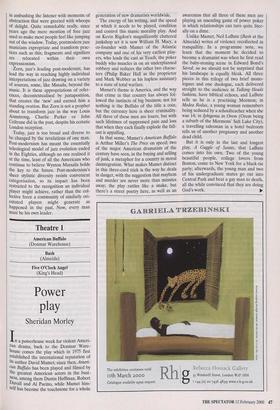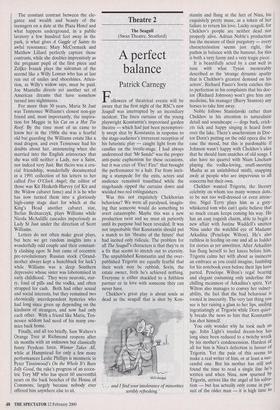Theatre 1
American Buffalo (Donmar Warehouse) Bash (Almeida) Five O'Clock Angel (King's Head)
Power play
Sheridan Morley
In a powerhouse week for violent Ameri- can drama, back to the Donmar Ware- house comes the play which in 1975 first established the international reputation of its author David Mamet; since then, Ameri- can Buffalo has been played and filmed by the greatest American actors in the busi- ness, among them Dustin Hoffman, Robert Duvall and Al Pacino, while Mamet him- self has become the touchstone for a whole generation of new dramatists worldwide.
The energy of his writing, and the speed at which it needs to be played, condition and control this manic morality play. And on Kevin Rigdon's magnificently cluttered junkshop set it is now William H. Macy, a co-founder with Mamet of the Atlantic company and one of his very earliest play- ers, who leads the cast as Teach, the poker buddy who muscles in on an underplanned robbery and reduces the other two charac- ters (Philip Baker Hall as the proprietor and Mark Webber as his hapless assistant) to a state of total warfare.
Mamet's theme is America, and the way that crime in that country has always fol- lowed the instincts of big business; not for nothing is the Buffalo of the title a coin, but the currency here is sheer criminality. All three of these men are losers, but with such lifetimes of suppressed pain and loss that when they each finally explode the fall- out is appalling. In that sense, Mamet's American Buffalo is Arthur Miller's The Price on speed; two of the major American dramatists of the century have seen, in the buying and selling of junk, a metaphor for a country in moral disintegration. What makes Mamet distinct in this three-card trick is the way he deals in danger, with the suggestion that mayhem and murder are never more than minutes away; the play rattles like a snake, but there's a street poetry here, as well as an awareness that all three of these men are playing an unending game of power poker in which relationships can turn quite liter- ally on a dime.
Unlike Mamet, Neil LaBute (Bash at the Almeida) writes of violence recollected in tranquillity. In a programme note, we learn that the moment he decided to become a dramatist was when he first read the baby-stoning scene in Edward Bond's Saved, so we should not be surprised that his landscape is equally bleak. All three pieces in this trilogy of two brief mono- logues and one duologue, each delivered straight to the audience in Talking Heads fashion, have biblical echoes, and LaBute tells us he is a practising Mormon; in Medea Redux, a young woman remembers being seduced by a schoolteacher when she was 14; in Iphigenia in Orem (Orem being a suburb of the Mormons' Salt Lake City), a travelling salesman in a hotel bedroom tells us of another pregnancy and another dead child.
But it is only in the last and longest play, A Gaggle of Saints, that LaBute comes into his own. Two of the young beautiful people, college lovers from Boston, come to New York for a black-tie party; afterwards, the young man and two of his undergraduate mates go out into Central Park and beat a gay man to death, all the while convinced that they are doing God's work. The constant contrast between the ele- gance and wealth and beauty of the teenagers on a date at the Plaza Hotel and what happens underground, in a public lavatory a few hundred feet away in the park, is what gives A Gaggle of Saints its awful resonance; Mary McCormack and Matthew Lillard perfectly capture those contrasts, while she doubles impressively as the pregnant pupil of the first piece and Zeljko Ivanek plays the salesman of the second like a Willy Loman who has at last run out of smiles and shoeshines. Atten- tion, as Willy's widow says, must be paid. Joe Mantello directs yet another set of American dreams that have somehow turned into nightmares.
For more than 30 years, Maria St Just was Tennessee Williams's closest non-gay friend and, most importantly, the inspira- tion for Maggie in his Cat on a Hot Tin Roof. By the time most of us came to know her in the 1980s she was a fearful old bat guarding the Williams estate like a mad dragon, and even Tennessee had his doubts about her, announcing when she married into the English aristocracy that she was still neither a Lady, nor a Saint, nor indeed very Just. But theirs was a cru- cial friendship, wonderfully documented in a 1991 collection of his letters to her called Five O'Clock Angel; the editor of those was Kit Hesketh-Harvey (of Kit and the Widow cabaret fame) and it is he who has now turned them into a gloriously high-camp stage duet for which at the King's Head another cabaret star, Stefan Bednarczyk, plays Williams while Nicola McAuliffe cascades imperiously as Lady St Just under the direction of Scott Williams.
Letters do not often make great plays, but here we get random insights into a wonderfully odd couple and their constant- ly clashing egos: St Just came of eccentric pre-revolutionary Russian stock (`Grand- mother always kept a hunchback for luck') while Williams was a deep Southern depressive whose sister was lobotomised in early childhood. They were neurotic, star- ry, fond of pills and the vodka, and often strapped for cash. Both had other sexual and social interests, but they remained two chronically interdependent hysterics who had long since given up depending on the kindness of strangers, and now had only each other. With a friend like Maria, Ten- nessee seldom had need of his many ene- mies back home.
Finally, and all too briefly, Sam Walters's Orange Tree at Richmond reopens after six months with an unknown but classically funny Feydeau farce, Winner Takes All, while at Hampstead for only a few more performances Leslie Phillips is mesmeric in Peter Tinniswood's On the Whole It Been Jolly Good, the rake's progress of an eccen- tric Tory MP who has spent 60 uneventful years on the back benches of the House of Commons, largely because nobody ever offered him anywhere else to sit.



































































 Previous page
Previous page